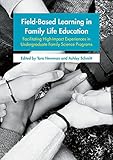Field-Based Learning in Family Life Education [electronic resource] : Facilitating High-Impact Experiences in Undergraduate Family Science Programs / edited by Tara Newman, Ashley Schmitt.
Material type: TextPublisher: Cham : Springer International Publishing : Imprint: Palgrave Macmillan, 2017Description: XVII, 218 p. 3 illus. online resourceContent type: text Media type: computer Carrier type: online resourceISBN: 9783319398747Subject(s): Education | Educational sociology | Higher education | Education and sociology | Sociology, Educational | Families | Families -- Social aspects | Education | Sociology of Education | Higher Education | FamilyAdditional physical formats: Printed edition:: No titleDDC classification: 306.43 LOC classification: LC189-214.53Online resources: e-book Full-text access
TextPublisher: Cham : Springer International Publishing : Imprint: Palgrave Macmillan, 2017Description: XVII, 218 p. 3 illus. online resourceContent type: text Media type: computer Carrier type: online resourceISBN: 9783319398747Subject(s): Education | Educational sociology | Higher education | Education and sociology | Sociology, Educational | Families | Families -- Social aspects | Education | Sociology of Education | Higher Education | FamilyAdditional physical formats: Printed edition:: No titleDDC classification: 306.43 LOC classification: LC189-214.53Online resources: e-book Full-text access | Item type | Current library | Collection | Call number | Copy number | Status | Notes | Date due | Barcode |
|---|---|---|---|---|---|---|---|---|
| E-Books | MEF eKitap Kütüphanesi | Springer Nature | LC189 -214.53 (Browse shelf (Opens below)) | Available | NATURE | 1419869-1001 |
Foreword -- Introduction -- Section 1: Internship and Practicum Experiences -- The Role of Practicum in Undergraduate Family Life Education -- Chapter 1: The Role of Practicum in Undergraduate Family Life Education -- Chapter 2: The Professional Sequence and High-Impact Teaching: The Introductory Course -- Chapter 3: The Professional Sequence and High-Impact Teaching: Skills, Methods, and Internships -- Chapter 4: Personal and Professional Development through Internship Engagement -- Chapter 5: Effectively Placing Family Studies Majors at Internship Sites: The ECU-LINK Match Process -- Chapter 6: Developing Connections: Using an On-Campus Event to Connect HDFS Students and the Community -- Chapter 7: Learning to Observe and Interpret Behavior as a High-Impact Practice within Family Science Courses -- Chapter 8: Learning through Engagement: A Praxis Approach to Teaching Family Life Education Methodology -- Section 2: Service Learning and Community-Based Experiences -- Chapter 9: Community-Based Learning with Young Children in a Child Development Center -- Chapter 10: Family Life Education with Diverse Community Partners -- Chapter 11: Interprofessional Field-Based Learning in a Program Planning and Evaluation Course for Students in Human Service Programs -- Chapter 12: Perspective Transformation via Service Learning in Family Life Education Methodology -- Chapter 13: Reverse Planning a Service Learning Activity for an Undergraduate Public Policy Course -- Chapter 14: Service Learning Design through a Management Model -- Chapter 15: Service Learning in Family Life Education: Incorporating High-Impact Strategies in Undergraduate Family Science Programming -- Chapter 16: Service learning in a Helping Skills Course -- Chapter 17: Teaching Grant Writing to Undergraduate Students: A High-Impact Experience -- Conclusion. .
This book provides successful models for field-based learning experiences in Family Life Education. Each chapter provides an overview of the implementation details, including key points that others developing a plan could use to guide their thinking. Each chapter is grounded in previous scholarship and identifies how the elements of high-impact practices are addressed in the "real world". Contributors share their experiences implementing service learning, internships, and other educational platforms outside the classroom walls. This book also addresses both specific content areas within family life education, as well as general course management strategies.
5
